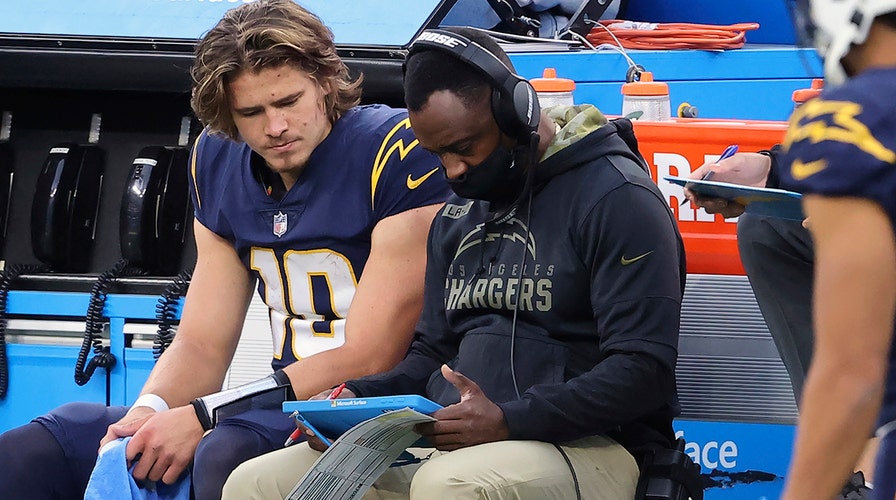Talking to GOATs with Jim Gray
The biggest names in sports share who they feel are the most iconic players.
The scouting report on Justin Herbert when he entered the draft out of Oregon was he had the tools to succeed as an NFL quarterback but would need some time to become more refined with the intricacies of the position.
Thrust into the starting role far earlier than expected because of an injury to Los Angeles Chargers starter Tyrod Taylor, Herbert is on pace for the most prolific season ever for a rookie.
One of the coaches most responsible for that transformation also could help the NFL in its quest to develop more minority coaches. Pep Hamilton joined the Chargers as one of the league's two Black quarterback coaches this past offseason and could one day become a candidate for a much more consequential job.
CLICK HERE FOR MORE SPORTS COVERAGE ON FOXNEWS.COM
“I have no doubt that Pep Hamilton can be a head coach in this league. He’s had a tremendous impact on Justin. That’s why I brought him here,” said the Chargers' Anthony Lynn, one of four minority head coaches in the NFL. “He’s a guy that can relate to people. He’s a good communicator, very intelligent. I’m very happy that he’s on staff, and I was fortunate to get him.”
The most recognizable and recent trend in hiring NFL head coaches has been to target young, innovative offensive teachers with a track record of development for the most vital position on the team. This has made the quarterbacks coach one of the most natural and reliable stepping stones for aspiring head coaches in the league.
With minorities making up fewer than 10% of quarterbacks coaches in the past decade in the NFL, that pipeline has played a role in a lack of minority head coaches despite a desire from the league for more diversity.
In the past five offseasons, nearly three-quarters (73%) of new head coaches have come from an offensive background, with two-thirds of them (16 out of 24) having served as quarterbacks coaches in the NFL earlier in their careers.
Only two of those 24 offensive-minded head coaches — Hue Jackson and Lynn — were minorities.
With no signs of a reduced interest in offensive-minded head coaches, the key for more diversity might be getting more minorities into that stepping-stone job of QB coach.
“You deal with the quarterback every day and you get them ready to play, and you know how to call games according to their strengths and what they see,” said Minnesota Vikings offensive coordinator Gary Kubiak, whose first coaching job in the NFL was as quarterbacks coach for the Super Bowl champion San Francisco 49ers in the 1994-95 season. He wound up working 10 years as a head coach for two teams, a tenure shortened by health concerns.
“I think dealing with those quarterbacks every day is a big, big plus," Kubiak said. ”I look at some of these guys who have worked for me in the past, and they have all come along that path. I think it’s extremely important coming up as an offensive guy."
Kubiak served as an offensive adviser for the Vikings last season, with Kevin Stefanski directing his scheme as the offensive coordinator. Now the 38-year-old Stefanski is in charge of the Cleveland Browns, one of 13 current head coaches in the league who were once a quarterbacks coach. That doesn't include Kliff Kingsbury (Arizona Cardinals) and Matt Rhule (Carolina Panthers), who previously held that particular position for college teams.
Eight of them were hired within the last five years: Stefanski, Zac Taylor (Cincinnati Bengals), Matt LaFleur (Green Bay Packers), Frank Reich (Indianapolis Colts), Matt Nagy (Chicago Bears), Kyle Shanahan (San Francisco 49ers) and Doug Pederson (Philadelphia Eagles). So many of these coaches picked to supervise quarterbacks once played the position at a major college or for an NFL team themselves, with Pederson and Reich to name two.
The trajectory of a franchise is staked so close to the success of the starting quarterback that this movement is hardly a surprise. Here's where the trend gets tricky for a league that's still lagging behind — as its leaders have acknowledged frequently — in consistently creating advancement opportunity for minority-race coaches. The quest to hire more head coaches of color becomes hindered when so few of them are offensive coordinators and quarterbacks coaches.
Since the start of the 2010 season, there have been 109 different quarterbacks coaches across the 32-team league, several of them holding the same job for multiple teams over that span. Only 10 of those individuals are minorities. That includes Hamilton, who was the quarterbacks coach at Stanford, tutoring Andrew Luck, and later the offensive coordinator for the Indianapolis Colts when Luck was starring there.
Eighty-four of those 109 quarterbacks coaches had not been an offensive coordinator or a head coach prior to being hired for the post. Ten of those 84 coaches went on to become head coaches, and 33 of them made the next step up to offensive coordinator or head coach.
Getting more minority coaches into the quarterbacks coach pipeline could play a key role in the future. With more and more Black quarterbacks playing in the NFL, the options down the road should be more plentiful.
The NFL is also trying to incentivize teams to hire more minority assistants in stepping-stone jobs by offering rewards to franchises that develop minority head coaches and execs.
The league approved a proposal this week that will award teams compensatory third-round draft picks for two years if a minority assistant or executive is hired to a head coach position or primary football executive role with another club.
“We all recognize that we must do more to support development opportunities for minority coaches and all personnel,” commissioner Roger Goodell said. “This is an important initiative for the NFL.”









































